Link building was a BIG thing ten years ago but some say it’s now dead. SEO expert Gert Mellak says otherwise.
In this episode, he shares why link building is still a part of the equation and why you need it to improve your SEO performance.
Podcast: Download (Duration: 30:51 — 28.4MB)
Get Notified Of Future Episodes Apple Podcasts | Spotify | Amazon Music | Android | Blubrry | Gaana | TuneIn | Deezer | Anghami | RSS | More
In this episode:
01:35 – Are links still a thing?
03:14 – Good versus fabricated links
06:26 – Understanding the Google Sandbox
09:21 – How much of SEO is link building?
13:16 – Resources for building links
16:42 – A quick summary
17:46 – Outreach versus natural linking
21:59 – What’s an anchor text?
24:37 – In need of link building services?
25:50 – Does it actually get results?
28:50 – The key to SEO success
Stay on top of link building and SEO trends with help from James
Transcription:
James: James Schramko here. Welcome back to SuperFastBusiness.com. This is Episode 758. And we’re going to be talking about link building. Hard to believe we’re having this conversation in 2020 that link building is still a thing. It certainly was a big thing when I started online in about 2005.
But my guest, Gert Mellak, from SEOLeverage.com, has actually been online a lot longer than I have. Welcome back, Gert.
Are links still a thing?
Gert: Thank you very much James. Great to be on the podcast again. Yeah, link building has been said to be dead, I think, for 10 years in a row, probably. I’ve been doing this for 19 years. But links are still the thing.
So when social media popped up, everybody said, yeah, it’s going to be social signals and likes and comments and shares that are going to decide where a page actually ranks. And this is definitely part of the equation as we might be talking about later. But links are definitely still the thing you need for good rankings.
James: All right. I remember when I was learning about it, they were talking about links being like a vote. It’s like, if you were to ask a few people, ‘Hey, who’s the best SEO guy,’ and they will point over there and say, “Hey, that guy over there, Gert.” And if 10 people said the same thing, then at some point, you’d have to think, ‘Okay, this Gert, he must know what he’s talking about, because everyone says he’s the SEO guy (which is true, by the way).
And you can do it via links. Like, on someone else’s website, they can say, “Hey, if you want to check out some incredible search engine optimization service, head over to SEOLeverage.com.”
Now, it became pretty easy for people to manipulate this and then create their own pages and links that point back to their site. And I think there had to be some changes to the way that Google looks at it. But it would have to be true also that in terms of what people expected might be big, the social media signals, it’s probably very easy, as some of these syndicates in other countries have proven, to manipulate social media.
We’ve seen Facebook, for example, remove thousands of accounts from fake propaganda accounts. There was one in Brazil, I think. There’s been some Russian ones, where they’re just en masse setting up accounts to convince people of certain mistruths via, you know, good old propaganda, but on the social media front.
Good versus fabricated links
So how does Google figure out what links are good and which links are fabricated?
Gert: I think there are two very good points here. So in the past, it was really just the amount of links. I remember clients asking me for a proposal of 500 links from Mexico because their competitor had 300 links pointing to their website, and they wanted to outrank their competitor. So they needed 500 links.
It was just a numbers game, really. We created a proposal where we said, “Yeah, there is like a gap of 200 links. You need to bridge this gap and you need to get so many links. You’re going to get pretty much guaranteed ranking afterwards.”
So this was really back in the days. Your metaphor with recommendations of SEOs, for example, is very good and very valid, because you would only take into account recommendations from people who really know what they’re talking about.
So for example, me giving a recommendation for a good football player would have zero value because I’ve got no idea about football. Okay? So for me, giving this recommendation wouldn’t have any relevance. And relevance is what link building is all about.
So you want relevant sources, relevant websites, point to your website as a resource, as a source in a certain context. So for an SEO agency, a marketing site citing the SEO agency, an online marketer like you citing an SEO agency, has a good amount of value.
A completely unrelated site, like the local pharmacist website, talking about SEO in a blog post, is not going to have any relevance. So Google in many cases is going to, what we call, devalue those links. So they notice those links, but they immediately can tell, this is not relevant. Why should I take this recommendation into account? So I just ignore those. In the best case, an irrelevant link is just being ignored.
When it comes to social signals, we need to see that, today, the links that are created are usually not created right away. If you launch a site today, it’s just not a natural thing to happen to attract links from other blogs, other articles, unless there has been some social past, some social feedback happening first.
So if you have a brand, I just talked yesterday to a client in Canada or a potential client in Canada. They have been doing social media, they spend thousands and thousands of dollars every month on social media. So their social media feedback is very big. So for them to attract links to their site is just a natural process to happen. However, if you open up a restaurant, create a website, and from day one, get links to this website before you have some social feedback, it wouldn’t be natural.
So I think when it comes to link building, I think what Google really tries to figure out is if the process flows in a natural way in this industry. This might change. I just had a team training on this where we said, “Look, if you have a company that’s new, but they run a Kickstarter campaign and get a lot of social feedback, their postings go viral, it’s just natural for them to suddenly attract 500 links. Attracting 500 links for a normal website might just kill the website.” So Google figures out this is a spam intent. This is a manipulation intent, they might raise a so-called penalty against this website, which reduces or completely puts to zero their organic exposure.
Understanding the Google Sandbox
James: Can you talk about the Sandbox because we hear this term a bit? I’m just imagining, if you were a guest chef on a show like Master Chef (or whatever the top show is), in a large market, let’s say in America, you would expect that restaurants are just going to get linked all over the place. Like how would Google know this is a natural event instead of someone just going out on a spending spree?
“Put user experience first. “
Gert: Google takes into account all kinds of things. The Sandbox is something we talk about in SEO. Google officially denies there is such a thing. The Sandbox essentially means Google puts your website in some sort of protective space before you get exposure on Google. All platforms these days – Facebook, Twitter, Instagram, they are all being very protective of their users, because they’ve learned from Google that this is a good thing if you put user experience first.
So on Facebook, for example, you’re not going to get exposure to the entire market with an ad until Facebook tracks that your ad is good enough and users like it. So it really is going to expose your ad to the users. In SEO, Google is not going to expose the users to a website unless they collect a certain amount of, what they call, signals about this website. And this might mean that sometimes you come up on page one or page two, or sometimes you don’t. If you track your rankings, sometimes you see rankings jump around from page one to page 10, page one, page 10, which essentially doesn’t make too much sense. But what Google does is collecting signals.
We had a client that wanted to rank back in the days for email marketing, I remember. And we had this client jump from page, really among the 10 pages and completely invisible. And on page one, completely invisible. It was jumping around all the time. Google is collecting signals, until they found out that this site really is a legit site, is eligible to rank on page one. And then it came out of the Sandbox as we call it.
So the Sandbox is like a protective space around this website, where Google does some testing, collect some signals. And once Google is sure that this website is legit and can rank on a certain position, they start to send more traffic to it. First, it’s just really testing.
So there are different things you can do based on social signals, sending some links, sending some traffic, ads traffic as well to this website. All this is going to make Google get some signals and get it out of the Sandbox earlier because, very often, this is frustrating for site owners. They have launched their website, we did web design back in the days and web programming. So we know it’s frustrating to get a new website. They don’t find their main product on Google or on their website anymore, or not during the first few months maybe. So you want to send enough signals so Google can really figure this out.
Initially, they are going to estimate certain signals based on their site analysis. So you launch a new site, and if you think you need like 200 signals, they might estimate 50 of those already, just based on what they think your site is about. Then based on what they know, with their machine learning algorithms, that people are going to like about your site.
James: I think it’s funny, but I bet you the owner jumps on the phone when their website disappears.
Gert: Absolutely.
James: Where’s my website? What have you done?
Gert: All the time, all the time. They say, “Why is Amazon there and I’m not?”
How much of SEO is link building?
James: So I think it might be a common misconception, but I think a lot of people actually think link building equals SEO. Like how much of SEO is link building? Is it 90 percent? Is it 10 percent? Is it 50 percent? Is it possible to put a weighting on it?
“How much of SEO is link building?”
Gert: It’s really difficult because it depends not only on the industry, but also on the specific query you’re trying to target. Let me explain this a little bit more.
A lot of things in that are what we call technical SEO. Technical SEO and content marketing, which is all related to your website, to how you present content, how you engage with your audience, how you respond to your search queries. And technical SEO and content optimization, content structure is going to bring you up to a certain level, okay?
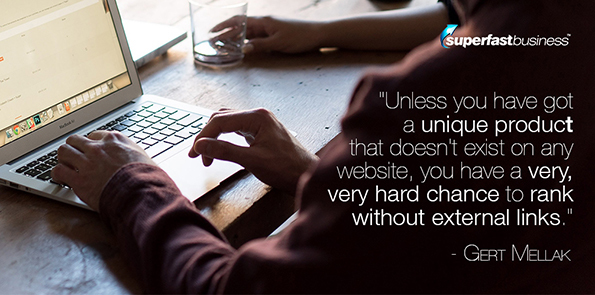 But then it’s really the links that point to this site that bring what we call link juice. We used to call this PageRank then Google said PageRank doesn’t exist anymore, however you want to call it. We still sometimes call it PageRank because it’s the same thing. There is power or energy flowing to your website, and your internal linking and your technical SEO distributes this power across your website. If there is no power coming in, there’s nothing we can distribute. So unless you have got a unique product that doesn’t exist on any website, you have a very, very hard chance to rank without external links.
But then it’s really the links that point to this site that bring what we call link juice. We used to call this PageRank then Google said PageRank doesn’t exist anymore, however you want to call it. We still sometimes call it PageRank because it’s the same thing. There is power or energy flowing to your website, and your internal linking and your technical SEO distributes this power across your website. If there is no power coming in, there’s nothing we can distribute. So unless you have got a unique product that doesn’t exist on any website, you have a very, very hard chance to rank without external links.
But then it really comes down to how many links and which type of link you need in a certain industry and for a certain search query. So there are industries that are very competitive – financial industry, tourism, for example. They are very competitive. They all have their SEO teams. Their SEO takes care of their technical side of things. So then what moves the needle in those industries is usually the quality and the strategy of the link building behind it.
If you have like a lower competition in the industry or at the terms you want to rank for, it can be enough to have a certain amount of authority or links pointing to your website, and then do the on-page optimization properly. So whenever we get a link building client, and we see that there are still issues on their site that need to be fixed, we usually recommend doing an audit first. Analyze the website, optimize the website, and make sure that once we send link juice to this page, it really can flow properly. There are no obstacles for Google to have this link juice or PageRank or power distributed on the site and recognize where it needs to flow to.
So link building should be part of the equation but on many projects, it’s going to be a little bit later after they start. Because firstly, they’re going to focus on having the site ready for Google, having the site optimized for Google, having the necessary content in place, and see how far we can get. Because then we can elaborate a custom link building plan and say, “Look, this is what we think you need. So the only thing that’s necessary is links on from here. So this is what we think is the gap between what you need for a page one ranking and what you have. And then let’s devise a plan on how to get there.”
“There’s no point getting links to a site that’s terribly designed.”
James: So I often used to talk about SEO a little bit like building a kite. You know, you build the kite and you want it to work really well with not that much breeze and then you can fly the kite higher and higher. It’s like getting more and more links. You know, you can’t fly a lead block or an anvil. You need to have a vehicle that’s going to work well when you get the link. So there’s no point getting links to a site that’s terribly designed.
And I’ve noticed just how important site architecture is. You have helped us with the site mapping. And when we identified a phrase I wanted to rank for and we created content around that, and we published it, we were ranking within an hour or so, for that phrase, like, position number one. It was just so powerful when you direct that link juice, as you call it (just as a side note, I actually own LinkJuice.com). And we were able to control where the flow of that goes and what results we get. So the external links come to the site, and then when it gets to the site, it’s what the site can do with it that makes such a difference.
Resources for building links
I’d love to know when it comes to getting links, because it really has to be a question like, how do we build links? I imagine you’re going to have to have some resources. It’s going to come down to relationships, connections, maybe some tools. What’s involved in that side of it? And is it a done-and-finished-type thing or is it an ongoing situation?
Gert: Two very good points here. So link building is definitely something ongoing. It’s like, if the local plumber gets recommended one day, and the next day, nobody talks about him anymore, he’s not going to get too much business out of it, right? Link building is the same. Google takes into account which sites get those votes of confidence over time.
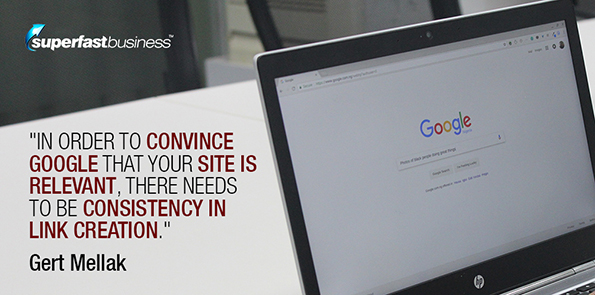 So there might be a social network, I don’t know, Myspace maybe, a few years ago used to get a lot of links and was like the social network everybody talked about and everybody linked to. Today, it might be Facebook, it might be Instagram, it might be TikTok, whatever. In order to convince Google that your site continues to be relevant, there needs to be consistency in link creation.
So there might be a social network, I don’t know, Myspace maybe, a few years ago used to get a lot of links and was like the social network everybody talked about and everybody linked to. Today, it might be Facebook, it might be Instagram, it might be TikTok, whatever. In order to convince Google that your site continues to be relevant, there needs to be consistency in link creation.
So once it’s really links that separates you from a top ranking (because everything is optimized), link building is pretty much an ongoing process. You might not always create links to the same URLs on your site, you probably want to create most links branded anyway. Branded meaning linking to your homepage, citing your brand. But then you can also send some links to inner articles or pillar pages as we call them, because they can then distribute this link juice better, across the site.
We’ve worked with a lot of companies that want to have their SEO in house, which is a very valid point; they want to create their SEO team. We essentially have a course, we have a coaching program where we help people do this. And we also do bi-weekly consulting with many companies that have their own SEO team, but they want to have some guidance, some external strategy or an external point of view, and get additional ideas, fresh ideas on where to move, what the competitors are doing, how to analyze this, how to analyze a Google update, like we just had on In May, for example.
So SEO in house, I think is a possible thing to do. However, when it comes to link building, it gets a little bit tricky because usually in-house SEO people are responsible for everything that’s SEO and link building would be a part of it.
The thing is that link building, dealing with link building just part time is very difficult. Link building means you reach out to not tens but hundreds and sometimes thousands of websites. You need the necessary tools, you need the processes in place in order to know what happens if they don’t respond after the third email, do a follow up again. We sometimes follow up five times with a single site just in order to create a communication going.
You need to have either a very good content or a very good argument in order for them to see the value in linking to your website. There’s a lot of things going into it. And while we train a lot of people in SEO ourselves, we usually tend to favor people with link building experience for link building tasks, because experience is just a very big part of it. So unless you have been in touch with hundreds of site owners and know what possible responses you get, what issues you come across, how to get a link verified, how to change the anchor text. There’s still just so much going on that you really can’t do this part time.
So my recommendation to most business owners is really to, even if they want to keep their SEO in-house is fine, get some external consultant having an eye on it. So you get some external feedback, but look to outsource link building.
A quick summary
James: Okay, so just a quick summary. You might have to start a conversation with people. There’s a fair bit of outreach involved, you’ll be dealing with site owners, there might be tools that help you discover which websites have got the perfect place where you would like a link, then you have to arrange for that to happen.
I know there’s rules around buying links and not. We might sort of speak to that in a minute. But just also that it’s something you should continue to do. And you’ve got to know what the level is in your industry, you got to know how much fit you’re going to need to be to compete with your competitors. Like, maybe the game is so difficult, you shouldn’t even bother. Or you have to select different phrases that you might want to go in on a side door, that bring people back around to where you want through internal navigation instead of going for the front door.
And you also should use links when you’re doing your social stuff, because that’s still a part of it. I’m sure a lot of people listening to the show don’t even know what MySpace is. That’s really dating you because that was sort of big, I think, when I started out online. And most important is you should just continue to do this process. So that’s sort of my summary to date.
Outreach versus natural linking
So just a couple of sub questions there. How much of link building is outreach versus having people linked to you naturally? For example, I put a software tool on my website at SuperFastBusiness.com/sixteen is a sales copy tool that is open to the public, that people can use to improve their sales copy. It doesn’t collect an opt in. And I know people link to it from other places.
So we’ve created something useful. I don’t know if you call that link bait. But it’s one way that I’ve come up that gets people into my site without having to do any outreach. But what other ways are there other than outreach, and how big is the outreach component?
Gert: I think unique content or building something useful is definitely one of the most important aspects. We’re working ourselves on a return on investment calculator, for example, in order to make it easier for people to calculate a potential return on investment on an SEO campaign right now, which is going to be a tool just like your 16 copywriting tool, which by the way, we’re using very frequently.
James: I built it for my team. We use it all the time.
Gert: It’s just so useful. It’s really useful to structure the ideas. Having something people really like, is going to be a lead magnet. Back in the day, I created a tool that opened up a list of URLs in different tabs. It’s everything that, this is just really a text field where you could paste in the list of URLs. And every SEO was happy because you could quickly go through a list of links, and check out the site without opening and copy and pasting everything in one.
There wasn’t a plug-in back in the days. This was all JavaScript coded. This naturally attracted links, we did some mentions on forums, etc. Obviously, people, they need to figure out what exists. But then, if it’s very useful and helping them or their audience, they’re very likely to link to it. Sometimes the outreach component isn’t really just asking for a link, but just raising awareness about something.
So in your case, reaching out to marketing blogs and the like, could be interesting just to tell them, ‘Look, we’ve created this tool, maybe you find it useful, check it out.’ That’s everything you probably need to do in order to get more links to it.
Sometimes it’s also advertising. So very often we see SEO too isolated. For me, SEO is just one tiny bit of marketing. Again, it’s a very important one, I think it should be one of the pillars of a successful and solid marketing strategy. But it’s just one and we need to think across different channels here and see if they do a Facebook ads campaign for a very good piece of content, the natural thing to happen is not only social signals from the social networks, but also that, at some point, it’s going to attract links.
I just saw a case study on SEO the other day, and it’s very likely we are going to cite it in one of the next posts when we talk about this topic because it also helps us. It helps our audience. We know we’re serving our audience by linking to it. It’s just a natural thing to happen. So outreach, I think, having a process where someone external who is able to do outreach to relevant sites is a good thing to have not only in order to get links and promote your content, but also just to raise awareness of what you’re doing, actually,
James: So I’m hearing that it might be a case of quality over quantity?
Gert: Absolutely quality really meaning also relevance. So you could get a link for a wedding planning company from a hosting site. And it could even be a good quality site, but it’s just not relevant, right?
James: But if it was from a wedding cake site, then wedding planning might be very relevant.
Gert: Exactly. And if it was from a hosting company that does wedding websites, it might pass as relevant, but you need to kind of then be a little bit more creative on how to create the context. Google is going to check out where this link comes from, not only the entire website and if it’s relevant, but also the surrounding of this link. So if the article doesn’t deal with weddings, why would you link to a wedding website? You want to create a context.
James: And in our previous episode, we talked about when you get links from the wrong site. So even bad people get links from terrible websites to try and make your link profile look terrible. And you gave us a recovery scenario in that situation. So you know, it’s worth mentioning that there’s bad links, and there’s good links, and then when there’s good links, there’s even, like better quality over just getting a lot of links should be the focus.
What’s an anchor text?
I would love it if you could speak to anchor text. I love the phrase, it really does say what it means but you might have to explain it, in case we’re not familiar with what that means.
Gert: Right. The anchor text is what you click on, the tag. You click on the text in order to get to the target website. So the text is usually underlined. We call this the anchor text. Anchor text used to be in everything we do. Today, in SEO, it really is based on what we took advantage too much in the past. Things change a lot, right?
In the past, what we would do, because anchor text was so important, if you want to wanted to rank for “best business coach”, you created a lot of links with the anchor text “best business coach”, and Google would pick up that apparently people refer to you as the best business coach, and they would rank you high for this.
Obviously, as we always do in marketing, we take advantage of what works in a given moment. So Google, at some point, said look, we know you’re trying to manipulate us, we might either reduce your visibility trust for this term, or we would issue a penalty directly.
 So good and bad link. Good links need to be relevant, but they also need to be natural. It’s just not a natural thing to happen that people are going to write a text, write best business coach, select best business coach, get your link, paste it in, place this link. The natural thing to happen is that they either mention your brand, or they paste a URL. Or they choose whatever varying anchor text from one link to that, is not going to be the same one.
So good and bad link. Good links need to be relevant, but they also need to be natural. It’s just not a natural thing to happen that people are going to write a text, write best business coach, select best business coach, get your link, paste it in, place this link. The natural thing to happen is that they either mention your brand, or they paste a URL. Or they choose whatever varying anchor text from one link to that, is not going to be the same one.
I just got from a coaching client of mine a list of 15 links they placed with an external company and the external company essentially used the same anchor text 15 times. So he asked me for feedback. He said, “Yeah, I kind of know what you’re going to say but still give me some feedback here.” And it’s just too obvious. Don’t make it too easy for Google.
So very often, I ask clients to put themselves into Google’s shoes. And say, “Look, if you were Google and you saw those links, what would you think, right? You would immediately spot that these links happened in five days. All these links have 80, 90 percent, the same anchor text. I’m not going to take these into account or maybe just one, not all of them. And I would pick one, okay?”
So the anchor text usually is going to vary, it’s not going to be the same anchor text. You don’t want to repeat the anchor text, not for external and also not for internal links.
James: Okay, and you’ve been sort of open about, you know, Google is going to judge this and penalize ones that aren’t going well. Just two main questions as I want to finish up here shortly, because I think you’ve been super generous. You’ve really covered what link building is. The fact that they are still important, that there are different types, whether it’s outreach or there’s having valuable resources.
You’ve talked about knowing where you sit in terms of the industry, using social signals, being relevant, having good quality, make sure you vary. So two questions. Gert, if I want help with link building, do you actually provide link building services?
In need of link building services?
Gert: We do provide link building services. So on our website, we’ve got three custom, three main generic packages that could be a fit for quite a few companies. But usually, people will reach out to us and say, “Look, this is the situation, this is what I want to achieve.” And we also will take, like, a very quick look on the website. If it’s not an audit that should be done first in order to optimize their website because sometimes link building isn’t even the thing; so people think it’s only links, but it might just be technical obstacles and good house cleaning that’s missing on the page in order to drive an increased amount of traffic.
And then the link parts come in. But definitely, we are doing link building on the team in quite a few different niches, even in different languages – German, English, Spanish and French right now. So definitely link building is just a very important part of the equation. If someone comes to us and link building needs to be done, our team is doing this, but we offer this as a standalone service, as well.
James: Great! And you’ll help people know which link building they need, if they need it at all. And I know, knowing you, Gert, I know you’d be the first person to say, “Listen, I don’t think that’s the right thing. You should start with something else,” which is what I like about you.
And secondly, the most important part is when you do this link building service, are you going to be making sure that you have varied anchor text and that they’re from the right relevant places and that it actually gets results?
Does it actually get results?
Gert: Exactly. Thanks really to your education in the last years and from your content, we have an SOP, we have a standard operating procedure on how we evaluate the quality of a website, the relevance of a website. We do a spam check. We check out what their link profile is like, if they only rank where they are based on a very shady link profile. So we also don’t want the link from them. We have our copywriters create original copy before we publish it. We get this reported to the clients, our clients know exactly what we’re doing. Clients know exactly what links are placed.
And we usually also always try not only to vary the anchor text, but also vary the type of links we place. Because you can see some companies only focusing on guest posts and this might work in the short run. But on an ongoing basis, this is going to create a very easily identifiable pattern. So we try to make it look as natural as possible.
Also, in terms of quantity, because it’s just not natural for a new site to attract mountains and mountains of links, you want to start slowly. We very often start with an entry or medium package with clients just to get link building going. Get them to see what link building really does for their site. Because once you rank with a good optimized site on page two, page three, maybe links are really moving you forward.
James: So it’s kind of like having a nice dessert after the main course. You know, like, it’s unnatural just to only eat dessert and you’re going to bloom into a new shape. It’s not good for you. So it’s not doing too much of a good thing and having someone there who’s going to control and regulate that in an ethical, responsible way to get the results.
I love being visible with you, Gert, seeing what you’re doing with the business. I know lots and lots of your clients, they’re listeners to this show. I love that you’re working with some of the team members that I worked with for so many years in my own SEO business. It’s lovely to see them continue to deliver at such a high level. I like being involved in your business now as a partner and seeing it grow.
And the fact that you come here and share the technical side, I think it’s really helpful because it’s so confusing to try and figure this stuff out. And what I’m really learning is that even though some things have changed, the core hasn’t really changed for the entire time I’ve been online. And that is give Google what they want, and they’ll reward you with a good ranking and it’s just a matter of not being greedy or tricky to get yourself penalized, and you will be rewarded. Is that right?
“SEO is a game of consistency.”
The key to SEO success
Gert: It’s absolutely right. SEO is a long game. SEO is not something, except for a few quick wins you definitely have in the first couple of months maybe, SEO is a long game. It’s a game of consistency like going to the gym. By the way, I should be going in again very soon and take my consistency up there. I’m too consistent on SEO and less consistent in my fitness routine, but you need to do the work over time.
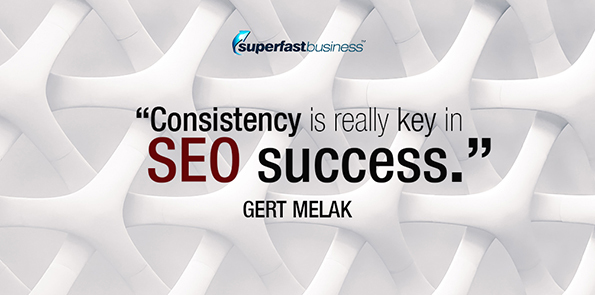 What I usually say is you need to fill all the buckets. Link building is one of those buckets you need to fill. Content optimization, structure, performance, there are a lot of other buckets we fill for our clients. And consistency is really key in SEO success.
What I usually say is you need to fill all the buckets. Link building is one of those buckets you need to fill. Content optimization, structure, performance, there are a lot of other buckets we fill for our clients. And consistency is really key in SEO success.
James: Yeah, it makes such a difference. You know, it just reminds me of today. We had really big surf today, Gert. It was quite big. And I paddled out with a friend of mine. And when we set out, I just went like crazy. I just paddled. I think I did 130 strokes in a row, got right out the back before the big waves came. And my friend turned to me, he goes, ‘You were just off like a rocket.’ I said, “Yeah, you know, I’ve been surfing every day and building my fitness so that I can because the last thing I want to do is get caught halfway and get smashed.” And, you know, he spent the rest of the session just sort of getting progressively smashed from out there all the way back into the shore. And I got this huge ride, I went really fast, it was exhilarating. But I had to do all the pre-season work to enjoy that ride.
So it’s like getting your site right, making sure it’s all optimized, that you have a good plan, things are structured the right way. I don’t think you’ve ever met a site that you couldn’t help unless they’re just too far spammy or penalized, you know? Like, there’s a lot of things that can be rearranged. And in our case, the biggest shock was that we had way too much content and when we pruned it, we got better results. It is super counterintuitive. So thank you for helping us. You better mention your website because you’ve been sort of teasing us a bit with all the things you can do. Where can we go and get help with our SEO?
Get help with your SEO
Gert: Yeah, just go to SEOLeverage.com. There’s everything in there from consulting to audit and link service, as well.
James: There you go. Gert, my famous SEO friend from SEOLeverage.com. This is Episode 758. If you’ve got questions about SEO, get in touch with Gert. If you want to leave feedback about this show, or you’ve enjoyed the technical advice, please let me know, put a comment there at SuperFastBusiness.com, because we can get Gert back and answer more SEO questions. He’s a really popular guest whenever he’s on the show. And as long as you still use Google to find things, Google SEO is still very important for your website. So get onto it. While everyone’s talking about chatbots and Facebook ads and Instagram hacks, the good old SEO is still a place to absolutely clean up.
Thanks so much for being on the show. Catch you on the next episode.
Want to keep your finger on the pulse? Join James inside our online business coaching membership at JamesSchramko (membership).
Need expert SEO help? Contact Gert at SEOLeverage.com
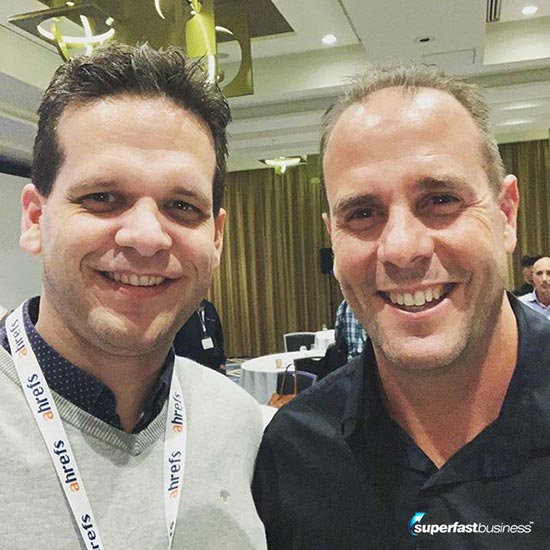
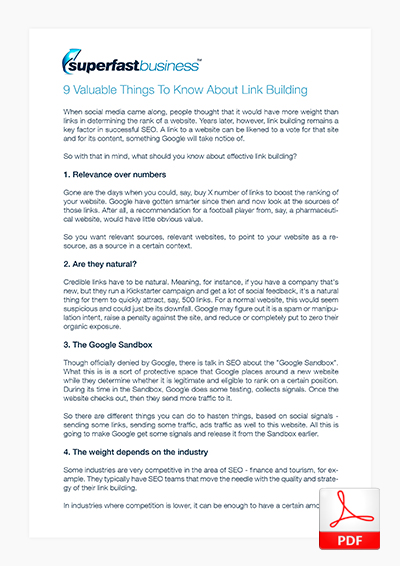









Great discussion, apparently links in blog post comments are good for ranking too, any thoughts on this?